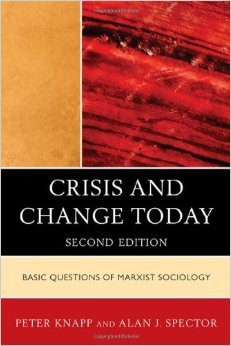 Understanding Marx
Understanding Marx
Review of Crisis and Change Today. By Peter Knapp and Alan J. Spector
William T. Hathaway -- World News Trust
April 21, 2014
Knapp and Spector have written a superb introduction to Marxist thought, a much-needed one, since reading Marx can be a daunting task. The grand old man's prose is often ponderous, abstract, and complex, so many readers can't discern his full meaning.
Crisis and Change Today is a lucid presentation of Marx's ideas, explaining his views on history, economics, politics, and philosophy in a way that makes them understandable and also does justice to their complexity. The book's clear, well-organized prose conveys the sweep of Marx's vision, the efforts his followers have made to actualize it, and the resistance they have encountered.
In pointing out both the achievements and failures of the attempts to build socialism, the authors avoid sectarian judgments, and they analyze the reactionary tendencies of our time without succumbing to defeatism. Their tone is never strident or proselytizing, and the book is helpful even for those trying to refute Marx's ideas. Both authors are professors of sociology, so the book is academically sound but still "reader friendly."
The section on the failure of socialism in the Soviet Union is particularly outstanding, going well beyond the simplistic rubber-stamp of "Stalinism" and analyzing the complex problems the new nation faced and the limited options they had to solve them. It presents convincing arguments that humanity can learn from those mistakes and do better this time.
The authors use the Socratic method of raising questions and exploring various answers. For example, to the question, "What are the capitalists' political resources under capitalism?" they respond in part: "The fundamental message and ideology -- the thing which is built into the rules of the game -- is 'being out for number one.' Racism, sexism, ethnicity, religious bigotry, regionalism, and a host of other ideologies translate selfishness into the systematic atomization of the society. In addition, groups are separated physically and occupationally and given different privileges. The result is that the whole society is pulverized and people are split apart. This increases the control of those at the top. Capitalists are not omnipotent, but their political resources are formidable. Wherever one looks for a force which might serve as a counter to capitalist interests -- in unions, in political parties, in religion, in voluntary associations, etc. -- one usually finds direct capitalist influence. One certainly finds various kinds of indirect influence in which groups are shaped by prevailing ideas and institutions. This is why Marx argued that 'the executive of the modern State is but a committee for managing the common affairs of the whole Bourgeoisie.'"
About our present dilemma they write: "As temporary remedies falter, economic crisis intensifies. Neither private credit, nor Keynesian economic policies, nor imperialism can permanently solve capitalism's problems. As a result, the capitalists must intensify their drive to squeeze extra profits from the working class. Mergers increase. Social services are cut back. Cities, bridges, and infrastructure decay. There is de-industrialization. Unemployment grows, tuition is hiked; jobs become temporary ... Maintaining a viable temperature or a viable ocean environment are not priorities. Superexploitation and segmentation intensifies and takes new and brutal forms. While some sections of workers could previously eliminate some of their problems by reform struggles, this becomes less true. While capitalists could previously give in to some demands, now they have little choice, and conditions worsen for most members of the working class and for many supervisors, managers, and professionals as well."
Crisis and Change Today enables readers to understand the crises that are sweeping over us with ever-increasing frequency and damage and the changes required to solve them. It's an excellent resource, not only the best introduction to Marx I've found but also a useful guide to overcoming our current plight.
***
William T. Hathaway is an adjunct professor of American studies at the University of Oldenburg in Germany and a member of the Freedom Socialist Party (www.socialism.com). His new book, Wellsprings, concerns the environmental crisis: www.cosmicegg-books.com/books/wellsprings. A selection of his writing is available at www.peacewriter.org.

 Understanding Marx
Understanding Marx








